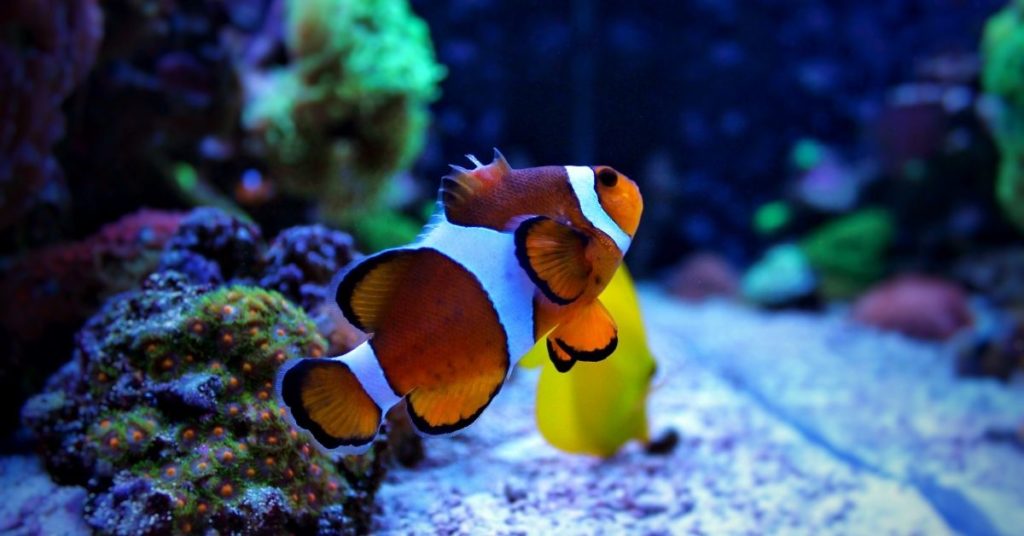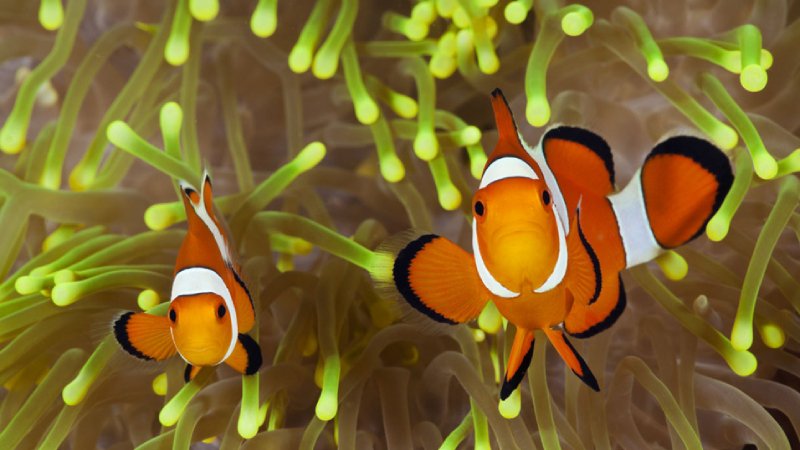In the popular Nemo movie, clownfish are portrayed as fun and friendly, but is this really true? Are they an aggressive clownfish and how well they actually get on with other tank mates?
There are many types of fish that can be included in any saltwater coral reef tank, and one of the fish that you might be tempted to have is the clownfish. Yes, these are indeed very beautiful looking fish, and yes, they are the same as Nemo from the popular children’s movies of the same name. That said, do they get along with others?
So, are clownfish aggressive with other fish? Even though clownfish have been given the impression that they are friendly by the Finding Nemo movies, clownfish are actually aggressive towards the other fish.
This article will explain the reasons why your clownfish is aggressive and what to do with an aggressive clownfish.
See also:
- Common Clownfish Behavior You Need To Know – Do They Fight?
- What Causes Are Clownfish Fighting? Don’t Worry Too Much
- Top 2 Exciting Facts Of Clownfish Mating Behavior- You Know?
- Acclimating Clownfish: 5 Important Things You Should Know
Why Your Clownfish Is Being Aggressive?
By nature, clownfish are aggressive and territorial. But there are also many other factors that can make them more aggressive, especially towards other fish in the tank.
Firstly, it was captured in the wild, instead of being born in captivity and being raised as a captive animal. Wild-caught clownfish are more aggressive and territorial than captivity-bred clownfish.
The second reason is that if you have anemones as a part of your aquarium, this may trigger the aggressive behavior of the clownfish as it defends its home and its protector.
There is also the possibility that clownfish can become aggressive if they are housed with the wrong tank mates.
The chances are pretty high that the stress caused by not housing a clownfish in an environment that is suitable for it, as well as an environment that is healthy for it, will result in aggression on the clownfish.
The lack of proper food is another reason why clownfish may become aggressive towards other fish.
What To Do With An Aggressive Clownfish?
While clownfish can be very aggressive and territorial, there are some ways to relax their aggression and make sure that they are not so aggressive.
As a clownfish owner, here are some of the most effective methods that you can use to greatly reduce your clownfish’s aggression;
1. Give Them Lots of Space
As clownfishes tend to be very territorial, especially when it comes to the anemones that they call home, you will want to give these fish a lot of space.
They are less likely to come into contact with other fish when they have more space in their system, and they are less likely to perceive other fish on their own system as antagonizing them.
It is recommended that each clownfish be given at least 10 gallons of tank space, but if you want to ensure the least amount of aggression, you should aim for at least 15 gallons of tank space.
2. Feed Them Right
There is a possibility that feeding fish too much can be a problem, as overfeeding can lead to health concerns and poor water quality.
It is important to feed your clownfish enough so that they won’t be aggressive. In the event that you feed your fish more than they need to survive, make sure to always clean out any food leftover. Clownfish are much less aggressive in the absence of competition for food, so they will not be aggressive at all.
3. The Right Tank Mates
It is helpful to place your clownfish in the correct tank with the right tank mates to minimize any aggression that may manifest itself when they are together.
Since clownfish are aggressive and territorial in nature, you should not add fish with similar personalities. Instead, add tankmates that are relatively small, peaceful, and don’t try to invade space’s others.
4. Good Tank Conditions & Quality

A clownfish that is less stressed out will be much less likely to be aggressive than one that is stressed out.
To make the clownfish stress-free, you need to provide them with good conditions. You can provide them with corals and spots to hide. Make sure the parameters of water, light, temperature are suitable.
5. Buy Captive Raised Clownfish
A clownfish that is born and raised in captivity is usually much less aggressive than a clownfish that has been caught in the wild.
Therefore, if you want to successfully cut out any aggression from the beginning, you should purchase a fish that was bred in captivity.
6. Keep Them in Pairs
When you keep clownfish in pairs, with one male and one female, you can reduce their aggression to some extent.
Keeping male and female clownfish together is likely to work out well, since they mate for life. Multiple pairs, however, can be a risky bet, especially if there is not enough room.
Some Other Related Questions
What are the most aggressive clownfish?
The Maroon clownfish are known to be a hand-biter, particularly the larger, female maroon clownfish is notoriously one of the most aggressive of the commonly kept clownfish varieties.
Do clownfish attack humans?
It is entirely possible, especially when they are aggressive fish. They can bite and almost always make you jump.
Will clownfish kill other fish?
Yes, clownfish can and do manage to kill other fish, and this occurs more frequently than most would admit. There are many reasons as to why this happens, but it is usually due to a lack of space in your tank, the wrong tank mates, or being forced to compete for food.
Conclusion
There is no doubt that clownfish act aggressively and are territorial. You can partially control the clownfish’s aggression if you follow all of the instructions that we have provided you here. You shouldn’t experience any problems if you follow the instructions correctly, and to be honest, these fish are so adorable!

Annette M. Chaney is an experienced marine biologist with over 20 years of experience as an aquarist and fishkeeper. She started her first aquarium at a young age, filling it with frogs and goldfish obtained from the ten-cent pet store.
Annette grew up caring for and breeding African Cichlids, which led to a hobby in high school that doubled as a profitable means. Attending Reed College gave her time to solidify herself as an accomplished aquarium caretaker with an eye for sales. After that, from 2009 – 2013, she studied at Roger Williams University – one of the most prestigious universities for Aquaculture and Aquarium in USA. She is the founder of AquariumCircle since 2010.
